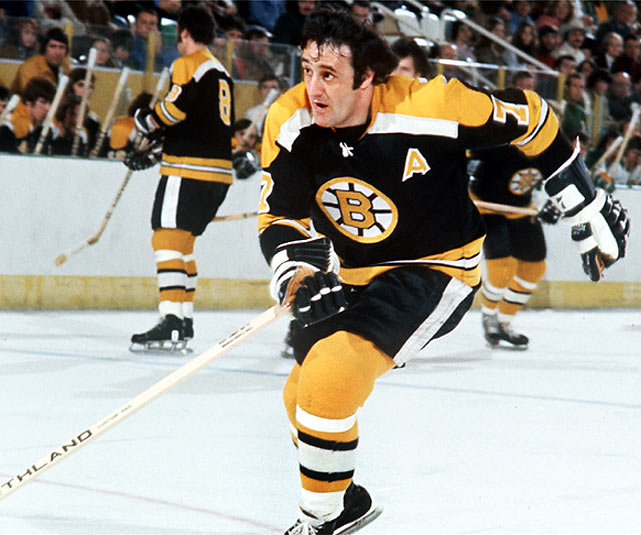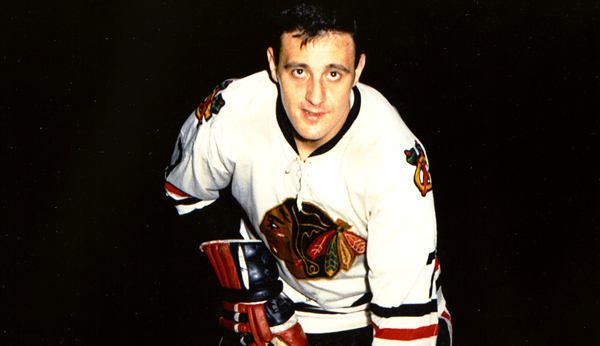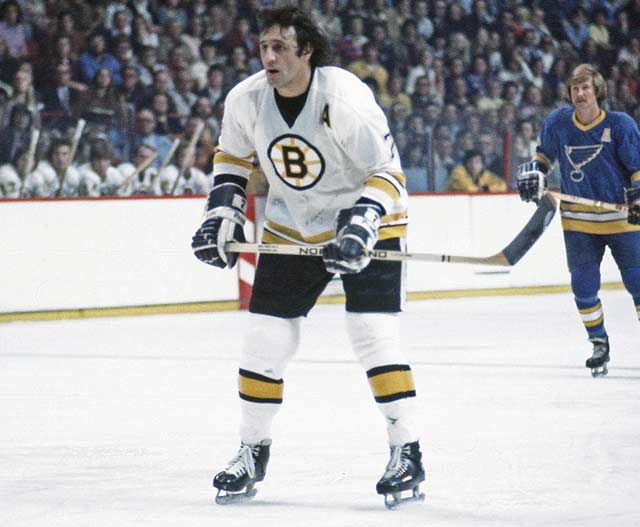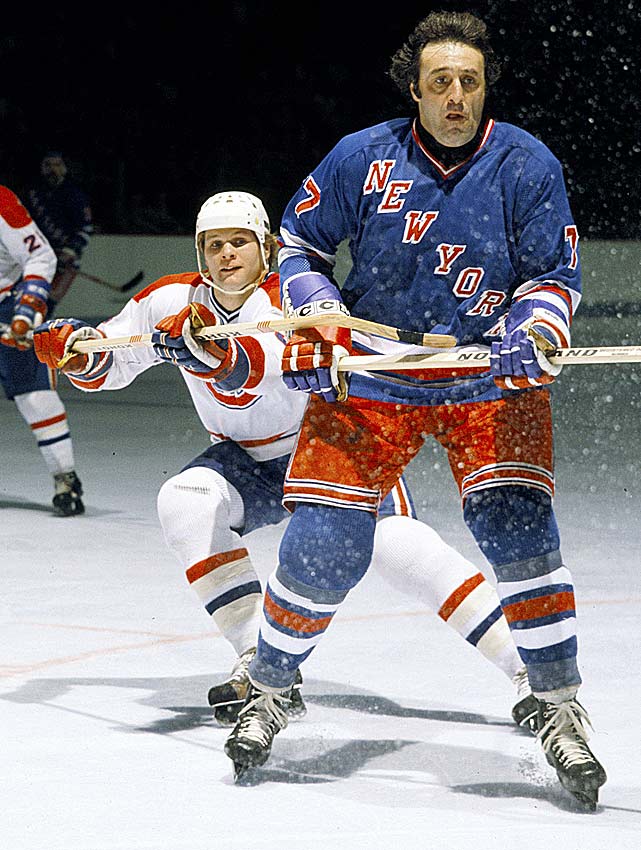
(Photo Credit: Tony Triolo Sports Illustrated)
By Joe Chrzanowski | Follow Me on Twitter @jchrz19
This week I have been working on an article about where David Pastrnak’s and Brad Marchand’s seasons project in regards to the greatest Bruins seasons of all time. The problem was that as I was researching and writing the article, it started to become more about B’s legend Phil Esposito than about the aforementioned players. At that point, I figured it would probably be a good idea to just dedicate an article to Esposito himself, and here we are.
Esposito was born on February 20, 1942, in the city of Sault Ste. Marie in the Ontario Province of Canada. His younger brother Tony was born in 1943 and legend has it that Phil forced his baby brother to play goal so that he could practice his shooting. Whatever they did back then, it appears to have worked out pretty well, as both are members of the Hockey Hall of Fame. The elder Esposito was signed by the Chicago Blackhawks and was told to join the Sarnia Legionnaires. He was a high-scoring player even as a teen, putting up 47 goals and 61 assists in only 32 games for his Junior B team. The following season he moved up to play for the St Catherines Teepees in the OHA-Jr league (sort of a precursor to the modern-day OHL). The jump in the competition didn’t seem to slow him down, and he recorded 32 goals and 39 assists (71 points) for the Teepees in 49 games.
In today’s NHL, a scorer like Esposito would have probably gotten a long look for the big club, but things worked differently back then. Despite his scoring prowess, when Esposito turned pro, he was assigned to the St. Louis Braves of the EPHL/CPHL. These leagues were started by the NHL and fully controlled by them in an attempt to have more control over the development of players. At the time, other professional leagues like the AHL existed but did not have strong relationships with NHL teams they do now. His first season with the Braves Esposito had 36g/54a in 71 games but was not called up. The following year (1962-63), he produced 24g/54a in only 43 games and got the call-up. In 27 NHL games that year, at the age of 20, Esposito had 3g/2a. While not the most auspicious start, he showed enough to the Chicago brass to earn a spot in the NHL for good.

(Photo Credit: The Hockey Writers)
He spent the next three seasons in Chicago, Espo put up some very good numbers. In 208 regular-season games in the Windy City, he had 71 goals and 98 assists, much of the time centering Bobby Hull. What a lot of fans today may not know is that despite these stats, Chicago did not see Esposito as a good “fit” for the team. When the Blackhawks were eliminated in the 1966-67 semifinals by eventual Cup champion Toronto Maple Leafs, Esposito had zero points in the six playoff games that postseason. He shouldered much of the blame from fans (and apparently staff) after the loss to the Leafs. The NHL was expanding from six to twelve teams in June of 1967, and the “Original 6” teams were going to lose a significant amount of players. Despite his statistics, the Blackhawks still considered Esposito an unproven talent and had no plans to protect him. So, on May 15th, 1967 (immediately before the rosters were frozen for the expansion draft), they dealt him and young forwards Ken Hodge and Fred Stanfield to the struggling Bruins franchise for veteran center Pit Martin (who they saw as Esposito’s replacement), 22 year-old defenseman Gilles Marotte, and minor league goalie Jack Norris.
The Blackhawks saw the three players they dealt to Boston as underachievers who would not be missed by the NHL club. The centerpiece to the trade in their mind was the promising young Marotte, who had been paired in Boston with defense partner Bobby Orr. They (and many others) thought at the time they had fleeced the Bruins and their new GM, Milt Schmidt. Of course, over the next eight-plus seasons, this would be proven to be the furthest thing from the truth, as the Bruins would establish themselves as one of the dominant NHL clubs of the early and mid-’70s.
The long term benefits notwithstanding, the trade also paid immediate dividends for both Boston and Esposito. In his first year with the Bruins, he was named Assistant Captain and had 35 goals and 49 assists in 74 games, good for second in the NHL. Former teammate Stan Makita was the only one who finished above him (with 87 points). More importantly to Boston fans, the Bruins made the playoffs for the first time since the 1958-59 season. While they were swept in the first round by the eventual Cup-champion Canadians, it would mark the start of a 29 year consecutive run of playoff seasons in Boston.
The following season would result in more milestones for both Esposito and the team. In 1968-69 Esposito would become the first NHL player to reach 100 points in a season in the league’s history. Bobby Hull and Gordie Howe would also reach the century mark that year, but Esposito would hit it first and lead the league with 126 points during the regular season (49g/77a). This season would also start to establish Esposito, Ken Hodge, and Wayne Cashman as one of the most feared lines of the early ’70s. Hodge finished 5th in the NHL in scoring with 90 points (45 goals) and Cashman added 31 points in just 51 games. These numbers were due in large part to Esposito’s skill and influence. The Bruins as a team also improved, sweeping a series against Toronto, including outscoring them 17-0 (10-0 and 7-0) in games one and two at home. The Bruins would lose to Montreal again, but this time in a hard-fought six-game series in the Semifinals. Montreal would go on to sweep the St. Louis Blues for yet another Cup. Not the ending the Bruins were hoping for, but things were certainly looking up.

(Photo Credit: Boston Bruins Alumni)
The next season, Esposito would take a bit of a step back from a personal standpoint. In 1969-70, he “only” produced 43 goals and 56 assists for 99 points in 76 regular-season games. That would be good enough for second in the NHL, behind teammate Bobby Orr, who finished with 120 points (33g/87a). Despite the slight fall off for Espo, the Bruins as a team improved to the highest level. After tying Chicago for first overall with 99 points, the B’s faced the NY Rangers in the first round and defeated them in six games. Next up was the Blackhawks, and Esposito would get a measure of revenge on his old team with a four-game sweep. The Finals pitted Boston against the St. Louis Blues, who were there for the third straight year representing the West. The Bruins made short work of the Blues, sweeping them 4-0 and bringing the Cup back to Boston for the first time since 1941. Esposito finished the playoffs with 27 points (13g/14a) in fourteen games.
Over the next five seasons, Espo would help the B’s win a second Cup and from 1970-71 through 1974-75, he would score an absolutely unbelievable 326 goals and add 361 assists. His point total over those five years (687) was only seven less than Hall of Famer Cam Neely accumulated over his entire career. Production like that will more than likely never be equaled.
Unfortunately, things did not end smoothly for Esposito in Boston. During the 1975-76 season, coming off a 127 point campaign the year before, he reportedly became upset over the Bruins asking him to take a reduced role at the age of 33. After winning two Cups, two Hart Trophies, and five Art Ross trophies, Esposito left town the same way he arrived, via the trade. He was moved in November of 1975, along with defenseman Carol Vadnais for Jean Ratelle, Brad Park, and Joe Zanussi. He played in New York for five more seasons before retiring in 1981 at the age of 38. In New York, Esposito never attained the same level of success he had in Boston, but he still managed 404 points in 422 games while he played in the “Big Apple”.

(Photo Credit: Denis Brodeur 1980 NHLI)
Three years later, in 1984, Esposito would be inducted into the Hockey Hall of Fame. Three years after that, he would be involved in another remarkable ceremony, as the Bruins would retire Esposito’s famous number 7 jersey. The jersey was being worn at the time by a young player that would eventually become a B’s legend, Ray Bourque. Esposito had told Bourque he wanted him to keep wearing the number and assumed the proceedings would be strictly for “show”. Bourque surprised Espo and the team as well by removing the 7 jersey and revealing a number 77 jersey underneath that he would sport for the rest of his career in Boston, allowing Esposito’s jersey to be raised to the rafters.
After years of acrimony towards the Bruins because of the trade to New York, Bourque’s gesture went a long way towards healing the relationship between Esposito and the B’s. While the hard feelings may never completely go away, the jersey retirement was a fitting way for the Bruins organization to pay homage to it’s greatest goal scorer.
CHECK OUT OUR NEW BLACK N’ GOLD PROSPECT PODCAST EPISODE 6 THAT WE RECORDED ON NOVEMBER 26TH, 2019! OUR BNG PROSPECTS POD CAN BE FOUND ON THE SAME RSS FEED AS OUR ORIGINAL BLACK N’ GOLD HOCKEY PODCAST, WHICH CAN BE FOUND ON MANY WORLDWIDE PLATFORMS SUCH AS APPLE PODCASTS, GOOGLE PODCASTS, IHEART RADIO, SPOTIFY, SOUNDCLOUD, AND STITCHER.
[soundcloud url=”https://api.soundcloud.com/tracks/719004964″ params=”color=#ff5500&auto_play=false&hide_related=false&show_comments=true&show_user=true&show_reposts=false&show_teaser=true&visual=true” width=”100%” height=”450″ iframe=”true” /]


Leave a Reply